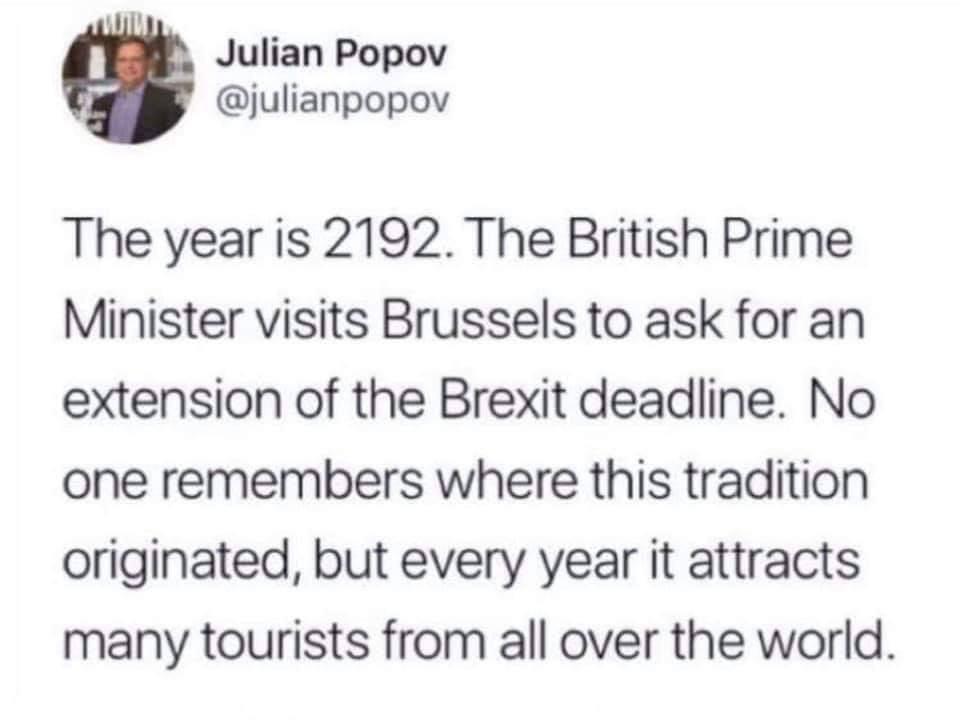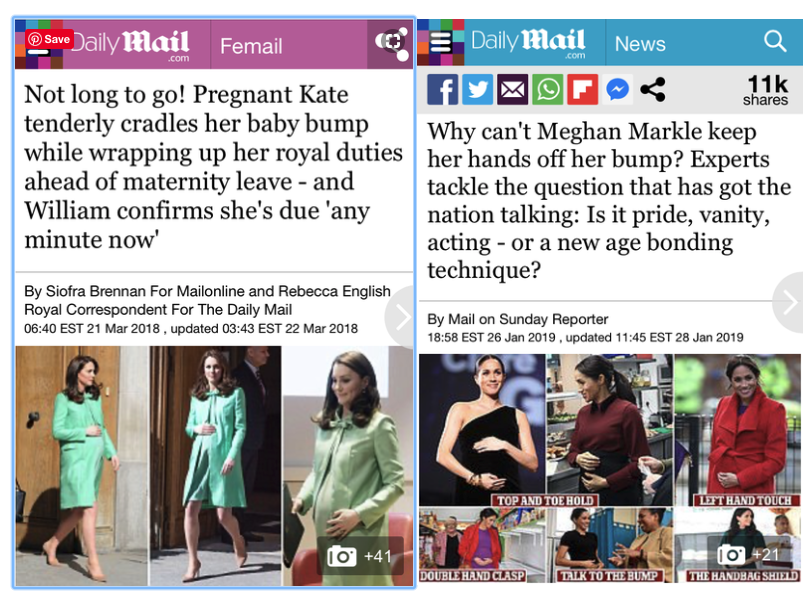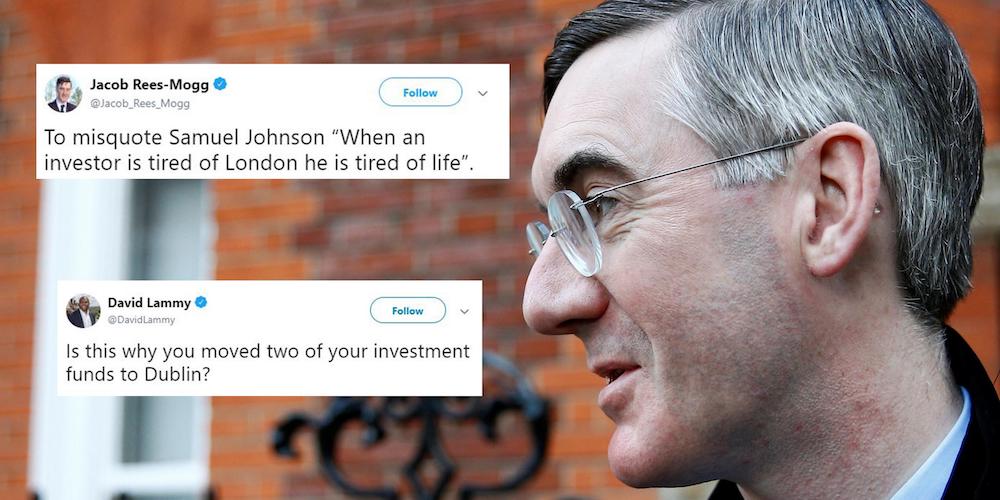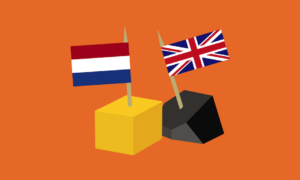(Editor’s note: Liam Fox infamously said Brexit would be “the easiest negotiation in human history.” Instead, we’re now on our fourth Brexit deadline, 31 January 2020, though it’s a done deal. Now the fun part begins – the 11-month transition period.)
When the Brexit vote came up on 23 June 2016, we went to bed that night thinking this wasn’t a big deal. Who in their right mind would vote to leave the European Union, the largest, richest and most frictionless single economy in the world?
We awoke to the answer on 24 June 2016: A majority – 51.9 percent – of the voters in the United Kingdom, or more than 17 million people.
In the run-up to the election, then-United Kingdom Independent Party leader Nigel Farage (who has a German wife and several French mistresses), Boris Johnson – now prime minister – and others on the Far Right had convinced a lot of British people the EU was the bête noire, responsible for all the UK’s troubles.
Leaving the EU would mean an extra 350 million pounds each week for the National Health Service; the UK would get a Brexit dividend and would soon be able to cut taxes with the windfall from brilliant new trade treaties around the globe.
None of which has turned out to be actually true.

Closing in on 29 March, 12 April, 31 October, 31 January 2020, what was billed as “the easiest negotiations in human history” went nowhere as former Prime Minister Theresa May’s government discovered what those Remoaners suspected – divorces are bitter to the end.
Now, after more than three and a half years, Brexit is finally a sure thing with Boris Johnson’s resounding mandate in the 12 December general election. But this is just the beginning as Johnson Government begins negotiations with countries inside and outside the EU.
SO WE HAVE A RUNNING UPDATE OF BREXIT DEVELOPMENTS:
• A no-deal Brexit is back on the front burner after Chancellor of the Exchequer Sajid Javid stated bluntly that the United Kingdom will not comply with European Union rules and regulations on the environment, taxation, social safety net or anything else. After all, as Theresa May so brilliantly observed back when this whole mess started, “Brexit means Brexit.”
“There will not be alignment; we will not be a rule-taker; we will not be in the single market and we will not be in the customs union — and we will do this by the end of the year,” Javid told the Financial Times.
That doesn’t leave a much for Ursula von der Leyen and Boris Johnson to talk about for the next 11 months.
The problem is, Britain wants tariff-free access to the EU markets, which are seven times as big as the UK economy. (The EU GDP is in aggregate about $20 trillion. The UK GDP in isolation is $2.6 trillion.) That said, the Brits also want continued access for their financial sector. So there still might be room for compromise.
• So, the nationalists and populist got their way. But Brexit increasingly is an existential moment.
That’s especially true for younger people, according to a New York Times post, “Megxit is the New Brexit in a Britain split by age and politics.” The departure of Harry and Meghan to Canada raises questions about Brits’ willingness to accept a bi-racial royal at a time when Brexit is vilifying foreigners and conservative are worrying barbarians are breaching the walls of Fortress England.
From the NYTimes post:
As the Harry-and-Meghan drama unfolds in breathless headlines and acres of news commentary, it is resurfacing the same questions that animated the Brexit debate. What kind of society do the British want: open or closed, cosmopolitan or nationalist, progressive or traditional?
We think Harry and Meghan are simply proof of our core adage: Everyone gets what they want.

• Speaking of Harry and Meghan, BuzzFeed has side-by-side comparisons of how the “royal rota” – the right-wing tabloids given preferential access to the royals – cover Kate Middleton and Meghan Markle.
What it comes down to is, everything the tabloids adore about Kate, they loathe about her black American sister-in-law.
Kate lovingly cuddled her baby bump while Meghan was ostentatiously obsessive about hers.
Prince William lovingly provides avocados to Kate for her morning sickness while Meghan’s addiction to the tropical fruit is wrecking the planet.
Kate’s wedding bouquet was a lovely nod to glorious Victorian times while the exact same flowers were deadly and could have wiped out the entire royal linage when Meghan included them in her wedding.
We were struck by how similar the two women behave to be of such different backgrounds … and how the tabloids found so many reasons to hate on Meghan Markle. Which we’re thinking really comes down to one reason. No surprise, the Daily Mail and Daily Express are particularly overt in their blatant, racially tinged attacks on Markle.
If you want to understand the essence of Brexit, read the BuzzFeed post.
• If you ask Boris, Nigel and Moggsy, they’ll tell you Brexit is an unqualified success. But if you start quantifying it, the empirical data shows it’s an economic bust.
Bloomberg has a post, “$170 Billion and Counting: The Cost of Brexit for the U.K.,” that breaks down how much leaving the EU has damaged the UK economy:
- $170 billion less economic activity with another $70 billion lost by the end of 2020.
- the gap between the GDP growth of Group of 7 and the UK is widening as the British economy sputters.
- the British economy is now 3-percent smaller than it would have been had Brexit never happened, with annualized economic growth halved to 1 percent from 2 percent.
• Brexit is finally a done deal. On 9 January, Commons approved by a wide margin – 330 to 231 – the legislation needed to codify Boris Johnson’s Brexit deal, which now goes to the House of Lords. So all systems are go for the United Kingdom to be free – free! – of European Union tyranny come 1 February.
Well not quite … there’s still the 11-month transition period and EU rules still apply while Boris and Ursula von der Leyen slug it out over trade, security agreements, fishing, flying, cross-border train travel and all those pesky details that govern UK/EU relations.
Von der Leyen has been adamant that 11 months isn’t enough time. Boris has said it better be because he’ll be dead in that ditch before he extends the negotiations.
The only certainty? Expect another year of drama.
• In early January, British negotiators are getting their first taste of how difficult it will be to fulfill their promises of rainbows and unicorns. Australia is the first country to reject a deal that included visa-free work and travel between the two countries.
Trade minister Simon Birmingham said full free movement would not be accepted because it could cause an exodus of highly trained workers to the UK and an influx of unskilled British workers to Sydney and Melbourne.
Which is ironic after the Brits complained endlessly about the Poles.
About 120,000 Australians live in the UK, while 636,000 UK nationals were granted tourist, business or temporary visas in Australia in 2019. Australians can visit the UK for up to 6 months without a visa, but Brits must have an entry visa to visit Australia.
• With Brexit, nothing is the way you think it is. True, Great Britain leaves the European Union on 31 January. But that’s not really Brexit. The UK will still follow EU rules as it sets out to negotiate treaties around the world.
During the transition period through 31 December 2020, the UK must come to terms with the EU on a multitude of issues including trade. But there’s so much more … transportation, security agreements including counter-terrorism data sharing and regulation of healthcare standards and pharmaceuticals.
Except the UK might not have a full year to get all this done. An EU/UK summit is likely in June at which point both sides will have to assess where negotiations are and decide by 1 July if there should be an extension … another “die in the ditch” moment for Boris Johnson, who has sworn he’ll never extend Brexit past 31 December.
EU officials have said 11 months isn’t sufficient time to negotiate such a tangle of details, with such negotiations typically taking years. So at this point, a no-deal Brexit seems like the most likely outcome.

• As we’ve pointed out many times before, when it comes to the Brexit leaders, the hypocrisy is so thick you can cut it with a knife, particularly in the case of Nigel Farage, his German wife and French mistresses. But this even blew our minds (not to mention the minds of all the expats who posted it on various expat bulletin boards.)
Reuters is reporting that Conservative Party donors – mostly financial types – have been seeking Cypriot citizenship since Britain voted to leave the bloc in 2016 including billionaire hedge-fund manager Alan Howard and Jeremy Isaacs, former Lehman Brothers director for Europe.
From that post:
That some Brits who made a career out of assessing risk have applied for second passports may suggest sagging confidence in Britain’s economy after it leaves the EU. A broker who makes his living handling such passports says he’s seen a surge of enquiries from Brits looking for ways to keep their European Union citizenship.
While wealthy Tories with international businesses might love the concept of a small but great Britain, they’re not stupid. They’re hedging their bets, keeping a hand in with the go-it-alone crowd while keeping their EU freedom of movement and financial ties.
They’re in good company with James Dyson, who help fund Brexit, then promptly bolted for Singapore and took his consumer-goods multinational with him.
While the Brexit rhetoric was the stuff to get a patriotic chap’s blood flowing, the thought of actually living through years up upheaval appears to be sobering.
• Boris Johnson is using the Conservative Party’s 80-seat majority in the House of Commons to fulfill his promise of leaving the European Union on 31 January 2020, with parliament set to negotiate the final details of the Withdrawal Agreement Bill. But the outcome is fairly certain … the United Kingdom will be clear of the EU come 1 February 2020. Humans have a difficult time taking current events and projecting out in time. In this case, it’s understandable.
The fun starts on 1 February as the 11-month transition period kicks in … all the time Boris & Co. have to hack out multiple complex treaties with EU officials governing trade and immigration. Perhaps the biggest sticking point could be Northern Ireland’s border with the EU.
If those difference can’t be worked out internally and externally to everyone’s satisfaction (and let’s face it … if the past three years are any indication of what’s coming, there’s turmoil ahead), then boom … the much-feared no-deal Brexit would happen on 31 December, 2020.
• Once again, just like in 2016, most of the polls were wrong. Boris Johnson and his Conservative Party have trounced the opposition, redrawing the United Kingdom’s political map.
And that, ladies and gentlemen, clears the way for Brexit as early as the end of January 2020.
Or as the New York Times posted:
Mr. Johnson’s victory extinguishes the possibility of Britain’s reversing that decision, a dream that has been nurtured by millions who believe that the referendum was a catastrophic error and should be rerun.
Conservatives ended up with an 80-seat majority, the largest since Maggie Thatcher won her third election in 1987.
Britain – free of the unbearable tyranny of the European Union (and affluence, we might add) – will be great again as it spends the next several years renegotiating trade treaties around the globe including with the EU … which it will have just left.
The BBC has the best explanation of the lengthy and complicated process that lies ahead that, ideally, will produce a new treaty with the EU by June. If not, that opens the door to a no-deal Brexit. And as the BBC notes, “no trade deal of this size and complexity has ever been agreed between the EU and an external country anywhere near as quickly as the timeframe planned here.”
The New York Times editors clearly saw this coming and had an incredibly thorough examination of what’s coming, which you can see here, posted just after polls closed.
• The United Kingdom took a step closer to the no-deal edge as the long-awaited YouGov.uk poll shows that Boris Johnson and the Conservative Party could win a majority in the 12 December election.
The poll predict that as of late November, the Tories could win 68 seats, giving them a majority in Parliament. The reason everyone was waiting for the YouGov data is that the polling firm not only predicted Theresa May’s Conservatives would lose their majority in the 2017 elections, but the exact margin.
This sets up a scenario where his deal with the EU could prevail as Boris would no longer need the Democratic Unionist Party, which opposes his plans for Northern Ireland to remain in the EU customs union.
However, a Tory majority would also allow Johnson to make good of his promise to leave the EU deal, or no deal should European officials push back during the 11 months of trade negotiations that would follow parliament accepting his deal … which could mean a no-deal exit on 31 December, 2020.
As we get close to Christmas, Ivan Rogers’ post in Prospect Magazine is a must-read as the former representative to the EU lays out an argument that the worst is yet to come with Brexit using “A Christmas Carol” as the outline for this tale of woe.
• So, let’s say Boris wins the election and convinces Parliament to adopt his deal with the European Union? Then what? As the PM himself puts it, the EU and United Kingdom would begin trade talks from a place of “perfect alignment and harmony,” echoing David Davis’s now-infamous prediction that Brexit would be “the easiest negotiations in history.”
Ahhhhhh, no. Not according to the Financial Times. That would simply be the beginning of long negotiations with EU officials to hammer out maddeningly complex trade agreements.
Negotiations likely lasting years and so adversarial that one EU official told the FT:
What is going to come is going to be much more challenging and demanding than what we have seen up to now. I would not wish negotiating a trade deal with the EU on anybody. It’s the worst thing that can happen to you, especially if your administration doesn’t have any experience negotiating trade issues.
Read it and weep.
• Strong and stable? Not if you ask Elon Musk.
In the latest objective, non-partisan empirical evidence that Brexit is costing the UK every day, Musk announced that Brexit is the reason he’s choosing Berlin for the Tesla Gigafactory, R&D center and battery manufacturing plant, not the UK. “Brexit made it too risky to put a Gigafactory in the UK,” Musk said.
This is a big blow because Tesla invested at least $2 billion in Gigafactory No. 3 in Shanghai, and maybe twice that in the first Gigafactory in Nevada.
Earlier, NYC-based rating agency Moody’s announced it’s considering downgrading Britain’s credit rating to “negative” from “stable” citing Brexit as “triggered an erosion in institutional strength” that threatens its abilities to make good on its debt.
• He pivots. He fakes. He shoots. He misses.
Nigel Farage’s attempt to strong-arm the Conservative Party into embracing his no-deal Brexit goal fizzled from the beginning. Now, Farage has announced his Brexit Party candidates will not stand against Tory MPs in the 12 December general election. The Mirror is reporting that – as you would expect – his decision came after a round of dealmaking that includes a future peerage for Nigel. Which he says he refused.
Being Americans, we had to look up what that even means. A peerage would induct Farage into Britain’s hereditary nobility including a seat in the House of Lords. This, of course, would be the pinnacle of his laughable political career having tried – and failed – seven times to be elected a member of parliament.
We say, “Arise, Sir Nigel of Brexitania.”
• We’ve been talking and texting regularly with our network of British expats in Germany and the Netherlands and no one feels like they completely understand every twist and turn of the Brexit plot. If there is an agreement between Remainers and Leavers among our expats, it’s that not one positive thing will come out of this for them as they must now rush to do everything from registering with host countries to dealing with post-Brexit travel and work restrictions.
More to come on this point. Thanks, Dominic Cummings.
• File this under “Hope Springs Eternal.” The independent, nonpartisan National Institute of Economic and Social Research projects Brexit will cost the UK economy 70 billion pounds in growth. But government officials say, “Pish posh!” Freed of Brussels’ tyranny, the government will negotiate a comprehensive free trade agreement with the European Union more ambitious than the agreements on which the NIESR bases its projections. This after EU officials have never waivered for three years on one point – the UK will never, ever get a better deal that the 27 remaining EU countries. As it says above, divorces are bitter to the bitter end.
Moreover, multinationals – especially in the financial sector – are leaving the UK in droves, and the auto industry is winding down. So we get that Brexit is a huge boost for the economies of Belgium, Luxembourg and the Netherlands. But not clear on how the UK comes a net economic winner.
• Another day, another smackdown for Boris Johnson as John Bercow ruled on 21 October that Johnson can’t resubmit his Brexit deal after Sir Oliver Letwin’s motion to block a no-deal Brexit carried the day earlier.
Pouring over everything that’s come before, we believe the only Brexit predictor is the Irish border. The unionists in Northern Ireland simply will not support any legislation that smacks of sacrificing their connection to the UK, leaving them under the brutal jackboots of the EU.
Trouble is, they see a glaring hole in Johnson’s plan – because the Irish border becomes the UK’s border with the EU, Northern Irish businesses will have to complete exit declarations when sending goods to Great Britain. That’s basically filling out a meaningless form that says goods are leaving the EU’s customs territory, but a regular customs declaration isn’t needed.
Except symbolism is everything in Ireland, and this one tiny glitch is seen as a total betrayal to the Democratic Unionist Party. And without DUP votes, Boris can’t get anything done. What was that line again? “The easiest negotiations in history”?














